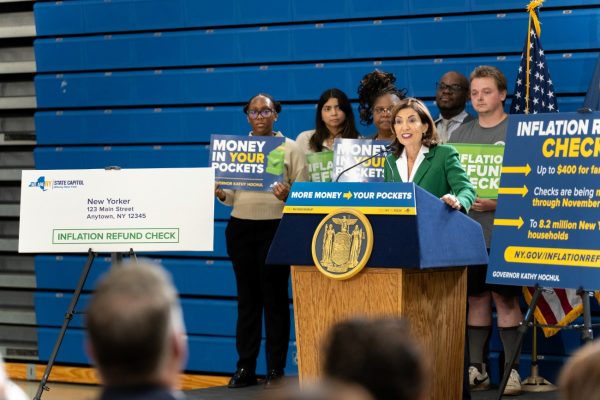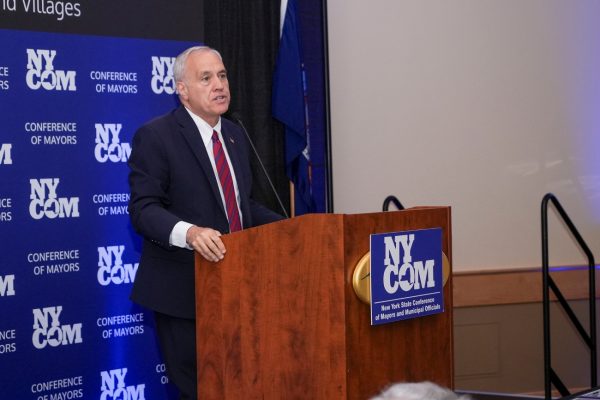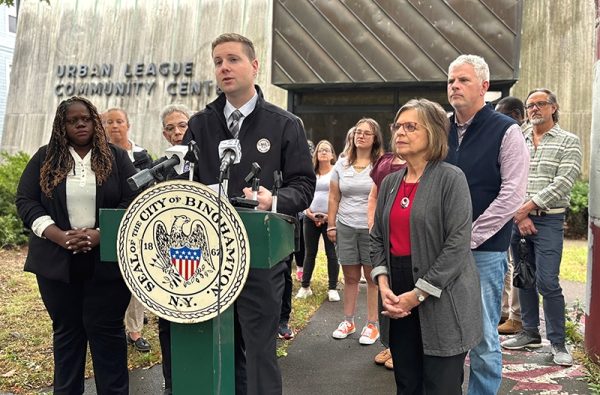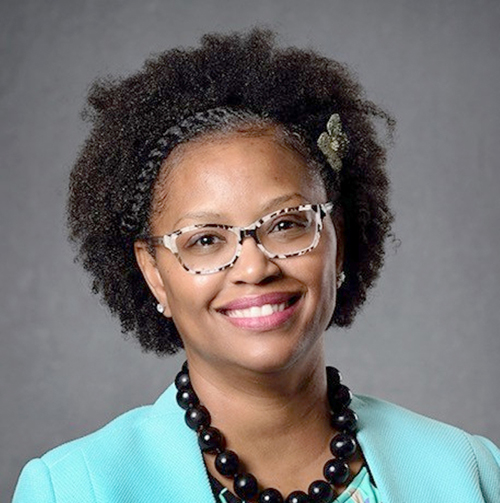Get our email updates
Stay up-to-date on the companies, people and issues that impact businesses in Syracuse, Central New York and beyond.
What's New
Upcoming Events
CNYBJ Job Board

New York is now mailing inflation-refund checks to more than 8 million households
ALBANY, N.Y. — New York State is now sending its first-ever inflation-refund checks of up to $400 to 8.2 million households statewide. As of Friday,

Spectrum donates additional $25K for workforce-development program at Syracuse community center
SYRACUSE, N.Y. — Spectrum has donated an additional $25,000 grant to the Syracuse Northeast Community Center (SNCC) to further enhance its workforce-development program. The funding

DiNapoli: Former treasurer of Oneida County fire department pleads guilty to stealing over $92K
DURHAMVILLE, N.Y. — The former treasurer of the Durhamville Fire Department in Oneida County pleaded guilty to stealing over $92,000 from the fire department over a seven-year period. As part of the plea, Kimberly Simchik, 62, of Durhamville will pay restitution of just over $92,000 and faces 1 to 3 years in jail at sentencing.
Get Instant Access to This Article
Become a Central New York Business Journal subscriber and get immediate access to all of our subscriber-only content and much more.
- Critical Central New York business news and analysis updated daily.
- Immediate access to all subscriber-only content on our website.
- Get a year’s worth of the Print Edition of The Central New York Business Journal.
- Special Feature Publications such as the Book of Lists and Revitalize Greater Binghamton, Mohawk Valley, and Syracuse Magazines
Click here to purchase a paywall bypass link for this article.
DURHAMVILLE, N.Y. — The former treasurer of the Durhamville Fire Department in Oneida County pleaded guilty to stealing over $92,000 from the fire department over a seven-year period.
As part of the plea, Kimberly Simchik, 62, of Durhamville will pay restitution of just over $92,000 and faces 1 to 3 years in jail at sentencing.
Simchik pled guilty to grand larceny in the second degree and corrupting the government in the second degree before Judge Michael Nolan in Oneida County Court. She is scheduled for sentencing on Nov. 21.
New York State Comptroller Thomas DiNapoli, Oneida County District Attorney Todd Carville, and New York State Police Superintendent Steven James announced Simchik’s guilty plea.
“Kimberly Simchik diverted fire department resources to bankroll her personal life, betraying the trust of the community she served,” DiNapoli said in the announcement. “My thanks to Oneida County District Attorney Carville and the New York State Police for their partnership in holding her accountable.”
DiNapoli’s office explained that Simchik stole over $90,000 in fire department funds by using the department’s debit card to make payments at local casinos and by diverting checks made out to the department into her personal account. She also spent department funds on plane tickets, spas, and nail salons.
The theft was discovered when a fire department member attempted to make a deposit and was informed by the bank that the department account had been closed due to a negative balance. The fire department subsequently reached out to the New York State Police, who partnered with DiNapoli’s office to conduct an investigation and forensic analysis. Simchik has since resigned from the fire department.

State awards Le Moyne College $5 million for graduate students pursuing health-care degrees
SYRACUSE, N.Y. — The New York State Department of Health has awarded Le Moyne College a five-year, $5 million grant to support graduate students enrolled

Binghamton leaders join YWCA to urge support for affordable housing, childcare project
BINGHAMTON, N.Y. — Local leaders joined representatives of the YWCA of Binghamton and Broome County to urge the state to support the YWCA’s $35 million

First phase of Rome Family YMCA’s renovation project is almost complete
ROME, N.Y. — Rome Family YMCA is “making significant strides” with the renovation of its W. Bloomfield Street facility, transitioning from plans for new construction to an “ambitious” remodeling effort. With the first phase approaching completion, the work conducted so far has included a brand-new Spin Studio with modern lighting, sound, and air conditioning, along
Get Instant Access to This Article
Become a Central New York Business Journal subscriber and get immediate access to all of our subscriber-only content and much more.
- Critical Central New York business news and analysis updated daily.
- Immediate access to all subscriber-only content on our website.
- Get a year’s worth of the Print Edition of The Central New York Business Journal.
- Special Feature Publications such as the Book of Lists and Revitalize Greater Binghamton, Mohawk Valley, and Syracuse Magazines
Click here to purchase a paywall bypass link for this article.
ROME, N.Y. — Rome Family YMCA is “making significant strides” with the renovation of its W. Bloomfield Street facility, transitioning from plans for new construction to an “ambitious” remodeling effort.
With the first phase approaching completion, the work conducted so far has included a brand-new Spin Studio with modern lighting, sound, and air conditioning, along with new paint, padding, and backboards in the gymnasium.
Crews have also installed an electric gymnasium divider curtain.
In addition, the work has included pool maintenance and safety upgrades completed during the summer, refinished gymnasium hardwood floors; delivery and installation of $175,000 in cardio equipment; and the renovation of the cardio room with modern lighting, electrical, flooring, and aesthetics.
The work that is still to come will include repurposing underutilized spaces, including new personal training and group exercise areas. Second phase projects will also involve locker rooms, spa, roof, and energy-efficient systems with support from National Grid and NYSERDA (New York State Energy Research and Development Authority).
The second phase work will target the venue’s heating, ventilation, and air conditioning system.
“This renovation allows us to expand our offerings and improve the facilities that have served our community for many generations,” Hank Leo, CEO, said in the announcement. The revitalized YMCA will feature modern fitness spaces, family-friendly areas, and enhanced programs for childcare and youth engagement. As the renovation progresses, the YMCA looks forward to inviting the community to experience the updates firsthand and join in the effort.”
The Rome Family YMCA was established in 1871. It is one of the oldest non-profit organizations in the region and was founded only 27 years after the first YMCA in London. Rome Family YMCA is part of the YMCA of the Greater Tri-Valley, which also includes the Oneida Family YMCA and YMCA Child Care in Whitesboro, per the website.

VIEWPOINT: Celebrating downtown Syracuse & looking ahead to exciting future
Downtown Syracuse is a lively and dynamic community. It’s a place where people live, work, and play, at it’s always changing and growing. The revitalization of downtown Syracuse reflects the collaborative efforts of community partners, residents, business owners, and investors, all driven by a shared vision for our city center. This vibrant social hub serves
Get Instant Access to This Article
Become a Central New York Business Journal subscriber and get immediate access to all of our subscriber-only content and much more.
- Critical Central New York business news and analysis updated daily.
- Immediate access to all subscriber-only content on our website.
- Get a year’s worth of the Print Edition of The Central New York Business Journal.
- Special Feature Publications such as the Book of Lists and Revitalize Greater Binghamton, Mohawk Valley, and Syracuse Magazines
Click here to purchase a paywall bypass link for this article.
Downtown Syracuse is a lively and dynamic community. It’s a place where people live, work, and play, at it’s always changing and growing.
The revitalization of downtown Syracuse reflects the collaborative efforts of community partners, residents, business owners, and investors, all driven by a shared vision for our city center. This vibrant social hub serves as a connector for people, and this united commitment has played a crucial role in making downtown Syracuse a destination known for its unforgettable experiences.
This year has been an exciting one for the Downtown Committee, as we celebrated our 50th anniversary. As an organization whose mission is downtown Syracuse’s revitalization and continued vibrancy, it’s been inspiring to look back and reflect on the early vision that our community had for downtown and the meaningful work and dedication that paved the way for where we are today.
Numerous projects throughout the years have contributed to this vibrancy, including the transformation of underutilized buildings into housing for new residents and space for emerging retail businesses. Efforts have continuously been made to uncover the original, breathtaking facades that lend our central business district its unique charm. Additionally, companies have moved to downtown Syracuse to attract talent and retain employees by establishing themselves in an urban environment that offers quality-of-life amenities for their employees.
What truly sets downtown apart is its people. Although foot traffic has been affected by the rise of hybrid work environments, the data indicates that individuals are returning to shop, dine, and enjoy their time in downtown Syracuse. We are seeing people return to the district to experience the lively culture that this community has nurtured and developed.
In 2025, downtown Syracuse had $275 million in the development pipeline. There were an anticipated 460 housing units and 245 new hotel rooms announced. These are positive trends that reflect the commitment, collaboration, and shared vision for a thriving downtown that feels welcoming to all.
Physical changes impact how people experience the downtown area. In September, downtown saw the opening of Central New York’s first STEAM School. Through partnerships, internships, mentoring, and job shadowing, the school will help prepare students for jobs in our growing STEAM fields.
CenterState CEO’s INSPYRE Innovation Hub will soon open, featuring more than 90,000 square feet of space for innovation and entrepreneurship. This reimagined space is built to spark bold ideas, accelerate growth, and support entrepreneurs at every stage.
For the first time in more than 60 years, Salina Street in downtown features two distinct theater marquees shining brightly. Earlier this summer, the Redhouse Arts Center revealed its brand-new marquee, symbolizing a vibrant future for downtown Syracuse, driven by arts, culture, and community.
As we celebrate a resurgence in downtown Syracuse, it’s essential to recognize the enduring strength of businesses that have thrived in this area for many years. These establishments form the backbone of our city center and play a crucial role in fortifying our community. In partnership with the City of Syracuse, we were proud to honor 16 downtown businesses with mayoral proclamations this past year, each of which has been a part of our landscape for more than 25 years. Notably, M. Lemp Jewelers stands out as the longest-running business in downtown, having proudly served the community for more than 135 years.
As we reflect on the progress that has been made, we also look ahead to an exciting future. Thank you to the many partners who invest their time and energy in creating a vibrant urban core. Your partnership and belief in our city center fuels this continued growth, and we look forward to celebrating many more milestones with you.
Merike Treier is executive director of the Downtown Committee of Syracuse, Inc. In this role, she leads a team to support a dynamic, vibrant downtown and promote future growth through economic development and revitalization initiatives, marketing and events, security, and environmental maintenance. Treier is also president of the Downtown Syracuse Foundation, Inc. Contact her at MTreier@DowntownSyracuse.com.

Soul Society serves up refreshments with style
SYRACUSE — Salon owner Michaela Kawryga recognized a need for a convenient place downtown for her and her stylists to get quick, nutritious refreshments, so she started a second business to do just that. In 2022, Kawryga opened Soul Society, a juice bar and raw café, in a space at 230 West Genesee St., adjoining
Get Instant Access to This Article
Become a Central New York Business Journal subscriber and get immediate access to all of our subscriber-only content and much more.
- Critical Central New York business news and analysis updated daily.
- Immediate access to all subscriber-only content on our website.
- Get a year’s worth of the Print Edition of The Central New York Business Journal.
- Special Feature Publications such as the Book of Lists and Revitalize Greater Binghamton, Mohawk Valley, and Syracuse Magazines
Click here to purchase a paywall bypass link for this article.
SYRACUSE — Salon owner Michaela Kawryga recognized a need for a convenient place downtown for her and her stylists to get quick, nutritious refreshments, so she started a second business to do just that.
In 2022, Kawryga opened Soul Society, a juice bar and raw café, in a space at 230 West Genesee St., adjoining her already-existing beauty and wellness studio called The Emerson.
“As stylists, we’re on our feet all day,” Kawryga said of the situation that led to what would become her second business. “We do weddings; we’re working long hours, back-to-back-to-back. [I wondered] how can I get my nutrients quickly?”
The answer Kawryga arrived at was juice and smoothies. She explained, “Working downtown for the past 10 years, we haven’t had a ton of places that did fresh-pressed juice and only fresh-pressed juice. So that’s the backbone of how I kind of ran myself. So, I was like, okay, let me implement that in the salon so that when people are sitting, they’re not Grubhub-ing, you know — pizza or Starbucks or Five Guys. They can walk over, pick something out. They know it’s going to be fresh. They can watch us make it.”
An opportunity to make that vision a reality arose when a space next to the salon she had operated at 230 West Genesee St. since 2020 became available. Kawryga took the space for her new business idea.
“I kind of just got to the point in my career where I was like, I’m going to try this out and I’m going to try and do it my way and I’m just going to take a leap. If it works, it works. If it doesn’t, it doesn’t.”
The end result was Soul Society — a juice bar and café that serves an array of beverages ranging from fresh-pressed juices to lattes; food options including “small bites,” charcuterie, salads, and sandwiches; a wide variety of smoothies; as well as alcoholic beverage options. While the cafe does no cooking, everything is freshly prepared.
In addition to serving food and beverages, Soul Society also functions as an event venue.
“We have bridal showers, baby showers, bridal parties,” Kawryga said. “We’ve had networking events. We’ve worked with the United Way. We do yoga once a month.”
The result of the combined salon/juice bar/event space approach has led to a diverse customer base. According to Kawryga, her customers represent “a broad demographic” including parents who might bring their children for a quick snack, older patrons in search of a smoothie, downtown-office workers, and Syracuse University students looking for a place to hang out.
Soul Society is physically joined to The Emerson salon in a space totaling about 7,000 square feet. The two businesses have separate entrances but connect in the interior, allowing for a number of synergies between them.
The combined operation employs 17 people. Kawryga explained, “Some of them work solely at the juice bar, some of them work at the juice bar and the salon, and some do aesthetics and also do events and catering for the juice bar.”
Kawryga says she self-financed both businesses.
The synergy is more than simply functional. Kawryga sees her two businesses as sharing a common spiritual philosophy, which is reflected in the name Soul Society.
“All the girls that work at the salon as artists were just very into the universe and alignment, soul family: the idea that people that are in your life now you’ve known in other lives and you reconnect for a greater purpose,” Kawryga said. “Like you go away to learn and get experience and then you come back together. So, when I wanted to open my second business, I was like: Soul Society — a society of souls.”
As the owner of two downtown businesses and a Syracuse native, Kawryga is upbeat about downtown’s future. She said, “I feel like I’ve seen new things popping up everywhere. A lot of women-owned [businesses] as well. So, I love to see that. I feel like we’re getting a lot of different things.”
As to her own business future, Kawryga has considered expanding into a second location, adding that there “is nothing on paper yet,” but she has had some ideas that would likely focus on wellness-themed juice bars and events.
In the meantime, Kawryga and the staff of her two businesses are enjoying their success in the West Genesee Street location. She reflected, “I feel like we’re just doing our own thing and we’re creating something that’s kind of just grown organically.”

INSPYRE Innovation Hub now open for startups, innovators, events
It’s the former Tech Garden SYRACUSE — After more than two years of work, the INSPYRE Innovation Hub (the former Tech Garden) is now home to the finalists in the Genius NY business accelerator and other tenants, and plans to hold events to welcome other entrepreneurs. Officials were scheduled to formally open the expanded venue
Get Instant Access to This Article
Become a Central New York Business Journal subscriber and get immediate access to all of our subscriber-only content and much more.
- Critical Central New York business news and analysis updated daily.
- Immediate access to all subscriber-only content on our website.
- Get a year’s worth of the Print Edition of The Central New York Business Journal.
- Special Feature Publications such as the Book of Lists and Revitalize Greater Binghamton, Mohawk Valley, and Syracuse Magazines
Click here to purchase a paywall bypass link for this article.
It’s the former Tech Garden
SYRACUSE — After more than two years of work, the INSPYRE Innovation Hub (the former Tech Garden) is now home to the finalists in the Genius NY business accelerator and other tenants, and plans to hold events to welcome other entrepreneurs.
Officials were scheduled to formally open the expanded venue in a ceremony on Sept. 18. The $32 million project added two stories and 46,000 square feet to the facility. CenterState CEO announced the new name during the April 23 annual meeting at the Nicholas J. Pirro Convention Center at Oncenter.
Buffalo–based M&T Bank (NYSE: MTB) on Sept. 10 announced it will be the founding sponsor of the INSPYRE Innovation Hub. M&T Bank’s sponsorship is for seven years but the bank didn’t disclose financial terms of the deal, a bank spokesperson told CNYBJ.
The long-term sponsorship with CenterState CEO will expand efforts to accelerate entrepreneurism and startup growth, “cultivate industry-disrupting” technology, and fuel the region’s ecosystem for talent development and attraction, M&T Bank said in its announcement.
With more than 90,000 square feet of space dedicated to helping founders grow their vision and bring a business to the next level, INSPYRE is New York’s largest business incubator, CenterState CEO said.
The expansion effort includes a 5,000-square-foot roof terrace for companies focused on uncrewed aerial systems (UAS) to launch and test drones; a 3,000-square-foot meeting room with seating for up to 180; private tenant offices for 35 additional resident startups; coworking areas; an expanded hardware space for prototype and product development; and a new entrance, as outlined in an Aug. 9, 2023 announcement from the office of Gov. Kathy Hochul.
In addition, the INSPYRE Innovation Hub will house a renovated Hardware Center and a new Makerspace. Besides the UAS testing deck, the venue will also include a media-production facility and new coworking spaces.
“We have a 200-person multipurpose theater. We’ll have a lot of room for networking events,” says John Liddy, VP of innovation and entrepreneurship, who spoke with CNYBJ in an Aug. 25 phone interview.
As CenterState CEO was planning for the expansion, officials spoke with entrepreneurs to find out what they wanted in the facility, Liddy notes. They indicated that they wanted other entrepreneurs. To facilitate that, CenterState CEO is planning to hold a number of events in the INSPYRE Innovation Hub. Liddy says the organization even hired an event coordinator, who started working back in the summer.
“Our goal in the first year is to have 100 events. Second year to have 200 events, and the third … 300 events. They’ll see a lot of other entrepreneurs in there,” Liddy says.
Hueber-Breuer Construction Co., Inc. served as the contractor on the project. Besides Hueber-Breuer, Eli Smith of E. Smith Contractors of Syracuse also contributed, and QPK Design of Syracuse handled the design work.
“We built out the second floor and then the third floor is a shell for future development,” Liddy tells CNYBJ.
He also notes that CenterState CEO has leased some tenants on the building’s second floor. In early September emails to CNYBJ, a spokesperson for CenterState CEO declined to disclose the tenants who signed leases and would only say that “we are nearly at capacity.”
New name
“I am so excited to reintroduce the community to INSPYRE Innovation Hub … and share this building’s next chapter with the entrepreneurs who are making our region more vibrant,” Robert Simpson, president and CEO of CenterState CEO said in the April naming announcement. “The name INSPYRE reflects both the expanded size and scope of our entrepreneurial programming and our vision for what is possible. This state-of-the-art facility is a symbol of CenterState CEO’s commitment to helping the business community thrive as Central New York begins a transformational period of growth.”
CenterState CEO on Aug. 9, 2023 hosted a groundbreaking event for the expansion project on the patio of the former Tech Garden across from the Marriott Syracuse Downtown.
Throughout the construction effort, INSPYRE employees and tenants were temporarily housed on the 8th floor at the nearby Equitable Tower 1 at 100 Madison St. in Syracuse.
“As it was before, people didn’t always understand what the Tech Garden was when they walked by. Our goal is to be open to the community and to serve not just tech companies (that’s why we took the name off the Tech Garden),” says Liddy “Everything from Main Street businesses to existing businesses that are looking to innovate. So, we want to be a place where all those innovative firms [can] come participate.”

New ON-RAMP CEO starts work on workforce-training initiative
SYRACUSE — The effort to renovate the former Sears building will take about two to three years, and crews from Sutton Real Estate Company, LLC have been working on weatherizing and cleaning the structure ahead of the upcoming winter season. That’s according to Carlene Lacey, CEO of the ON-RAMP initiative in Syracuse, who spoke with
Get Instant Access to This Article
Become a Central New York Business Journal subscriber and get immediate access to all of our subscriber-only content and much more.
- Critical Central New York business news and analysis updated daily.
- Immediate access to all subscriber-only content on our website.
- Get a year’s worth of the Print Edition of The Central New York Business Journal.
- Special Feature Publications such as the Book of Lists and Revitalize Greater Binghamton, Mohawk Valley, and Syracuse Magazines
Click here to purchase a paywall bypass link for this article.
SYRACUSE — The effort to renovate the former Sears building will take about two to three years, and crews from Sutton Real Estate Company, LLC have been working on weatherizing and cleaning the structure ahead of the upcoming winter season.

PHOTO CREDIT: CENTERSTATE CEO
That’s according to Carlene Lacey, CEO of the ON-RAMP initiative in Syracuse, who spoke with CNYBJ in an Aug. 27 phone interview.
The state’s ON-RAMP is short for One Network for Regional Advanced Manufacturing Projects. New York on March 28 announced the former Sears building at 1300 S. Salina St. in Syracuse as the flagship workforce-innovation hub of the ON-RAMP initiative.
CenterState CEO on July 10 announced it had appointed Lacey as the inaugural CEO of ON-RAMP Syracuse. In June, CenterState CEO said it officially acquired the former Sears building for the ON-RAMP initiative.
Both Lacey and CenterState CEO are currently working to secure a consulting firm to help them with the community-engagement component to help inform local residents about the purpose of the ON-RAMP program.
[The goal is] “so that we can … get the input and ideas from the community, particularly those who live around there as to what do they believe … so we’ll be intentional in developing and designing the renderings for that space utilizing the input,” said Lacey.
She also notes that the community-engagement events haven’t happened yet because CenterState CEO is still evaluating requests for proposals (RFP) to help the organization hold those sessions.
Initial work
Since beginning her duties as CEO back in July, Lacey has been working to establish a communications and marketing brand strategy. CenterState CEO is working with three firms to help complete the process by the end of 2025. The company called Such Chaos of Skaneateles is helping with the Syracuse ON-RAMP branding and logo; DD.NYC of New York City is helping with the website; and Phu Concepts of Rochester is assisting with the communications plan, Lacey said.
Besides the communications and branding component, the effort early on involves listening tours, understanding from a workforce programmatic perspective what the community is looking for, working to understand what workforce programming already exists for collaboration purposes, and working with colleagues on the industry-partner perspective to identify the positions and the roles that are needed so the training can result in job offers in the market.
“I’ve spent time writing and sending out the RFP for the community-engagement consultant that we’ll be bringing on,” Lacey noted.
She has also started building the organizational structure with position descriptions for the team that will help advance the ON-RAMP initiative forward.
In addition, Lacey has identified a temporary location to begin offering services before the end of 2025. She declined to name the location. Lacey currently does her work at CenterState CEO’s headquarters in the Pike Building at 115 W. Fayette St. in downtown Syracuse.
“I’m really excited to work with the community, the industry partners, as well as CenterState CEO to provide this meaningful service,” she said.
Lacey likes that the program will provide real-life training, workforce development, and a chance to pursue wealth-building wages for people who are typically in underrepresented communities.
“That’s really attractive to me,” she added.
CenterState CEO has programs such as Pathways to Apprenticeship and that will come under the umbrella of ON-RAMP, Lacey said. They’ll work with other organizations to help provide that advanced technical training for advanced manufacturing and building trades to meet the workforce needs that are coming now and into the future.
“Syracuse is the flagship organization, and we will, as a flagship, put the building blocks, the foundational tools in place that others can use as building blocks for their organizations across Central New York,” Lacey said.
Get our email updates
Stay up-to-date on the companies, people and issues that impact businesses in Syracuse, Central New York and beyond.
